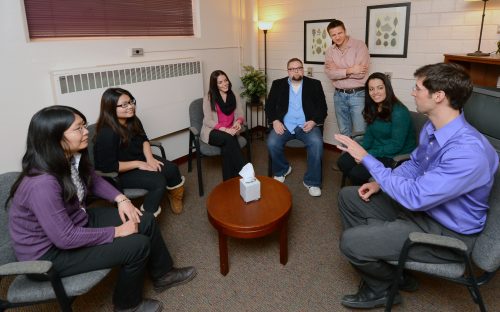What is the concept of a joint treatment approach? How can peer counseling through joint treatment help us with our daily struggles in life? Discover all in this article and know more about this counseling.

Instead, we fear that we have no one to talk to, so we shut ourselves out. We lock our rooms. We put on our headphones and sulk into the abyss of despair and overthinking.
Unlocking the Power of Peer Support: Exploring the Benefits of Empowering health and resources in Peer Counseling Sessions for Emotional Well-being
What is peer support? Does this type of counseling work for anyone? What entails a peer type of treatment? Is peer counseling resources beneficial?
Worry not, says a voice. There are some friends who are always willing to listen and understand. Even when they don’t understand, their presence and supportive interactions are enough to advise the raging storm in us. Marjie L. Roddick, MA, NCC, LMHC, used to say, “Your environment, both your social and natural surroundings, can greatly impact how you feel.”
Parents face a tough challenge when attempting to meet the emotional needs of their teenagers, and it’s extremely important that those struggling with mental health issues have someone to talk to who understands those challenges firsthand. Unlike other types of support providers, individuals offering mutual assistance may not always be professional practitioners. They are individuals who share similar experiences and provide guidance through active listening in supportive interaction programs. If you feel the need, you can always schedule an appointment with a trained counseling peer for more focused support.
Unlike other types of support providers, individuals offering support are not always professional practitioners.. They are individuals who share similar experiences and provide guidance through supportive interaction programs.
Here are Six Essential Facts About Therapy You Need to Know
- Does Not Mean You Have To Join “Support Groups” – History can attest that individuals open up to a person they can connect with and are comfortable with, which is their families and friends. They are non-judgmental and a great listener. Normally, when we speak of “peer counseling,” we regard it as joining therapy groups.

In reality, counseling with others may involve talking to your family or close associates. The individuals providing support may be people who are significant in your life.
- It Is A Natural Stress Remedy – What good can it make? For starters, a support program with others eases our anxiety. Professionals who understand our experiences assure us that we are never really alone and that someone can actually be there to listen.
Second, the comfort of empathy and relatability in talking to our peers gives us a sense of peace, knowing that we all go through hard times and that the world did not pour its pressure just onto one single soul.
- It Is More Than Just A Treatment – PPeer support is more than what most people suggest it to be. It is more than a form of counselor support, as training in being a peer counselor can have a profound impact. It resonates with talk therapy as one of the simplest forms of healing. It’s a baby step toward being open to the possibility of healing. “By building a list of people that you trust, with whom you can talk to in times of need, you allow yourself a strong sense of not being alone.” David Klow, a licensed therapist said.
Moreover, peer support is one way of creating a bridge between people, related or not. It breaks the walls that seemed to block an individual from realizing one’s worth through the help of other people. It can be beneficial to family members and people going through different challenges.
- It Takes Courage To Choose Peer Support As An Outlet – On the other hand, people think that being guided by peers may affect their anxiety, without them actually noticing. It’s that subconscious thinking of ‘What if they judge us? What if they don’t fully grasp our situation and they suddenly jump to negative conclusions?’

Deciding to be open to support from others says so much about someone. Actually, realizing that you would want to share your feelings and worries with those around you is already a sign of strength.
- It Requires Trust More Than Anything – It’s life’s irony to trust and doubt at the same time. Worse, when we open up to some people, we also want to immediately prove our worth. It is a process we have to trust and follow through. The vulnerability of our entire being that we actually sought peer support from another person we just met to console us can be so intense that it hurts us more than soothe us. That is why we need to talk to a friend whom we trust for support.
Support groups are like jumping off a cliff, knowing and expecting that down that cliff, there is someone who will understand and who is there to catch us..
- It Does More Than Just Talking – Honey, listen, it’s okay. We should all go through what we should all go through. That speck of light in our darkroom? That’s hope. This is the kind of understanding we get after the peer support program. The peer support program is designed to provide support and assistance and give people a touch of healing. It opens the idea that after letting all your feelings and worries out, you are on your way to recovery and would become a better person and receive support. As Dr. Aaron Kaplan, PsyD, Clinical Psychologist used to say, “Why talk about your problems including mental health challenges? Just talking about your situation to a supportive companion companion can reduce your stress and help you feel better.
Letting go of life’s anxieties and pressure is definitely helping to heal you and your soul.
Support from peers costs much less than therapy. The whole idea is that it’s accessible to anybody, especially for fellow students looking to enhance their professional development by utilizing resources at the counseling center, especially for those seeking mental health and health services guidance from trained peer counselors. Peer counselors will help you develop your own solutions to problems and uncertainties that work for you.
Deciding to be open to seeking support from others says so much about a person. Actually, realizing that you would want to share your feelings and worries with your peers is already a sign of strength.
FAQs
What Are The Four Fundamental Principles And Practices Of Peer Counseling?
The four fundamental principles and practices include equality, empathy, confidentiality, and self-determination. These principles ensure a respectful and supportive environment where individuals are treated as equals, their emotions are understood and acknowledged, their privacy is safeguarded, and they are empowered to make their own informed decisions
Why Is Peer Support Important?
It is important because it gives individuals a sense of belonging and understanding. It allows for the sharing of similar experiences and challenges, leading to validation and empathy. Also promotes empowerment and personal growth through the exchange of knowledge and skills. Additionally, it can reduce feelings of isolation and stigma, fostering a supportive community for individuals facing similar circumstances.
Can Peer Counseling Improve a Person’s School Anxiety?
Yes, peer counseling can help improve a person’s school anxiety by providing support, understanding, and strategies to cope with academic stress.
What Is the Meaning of Peer Counseling?
Peer counseling refers to a form of support and guidance provided by individuals who share similar backgrounds or experiences. It involves peers helping peers with emotional and psychological issues.
What Is the Role of Peer Counseling?
The role of peer counseling is to offer empathetic listening, emotional support, and practical advice to individuals facing personal or academic challenges. Peer counselors act as a bridge between professional help and those seeking support.
How Effective Is Peer Counseling?
Peer counseling can be highly effective, as it allows individuals to connect with someone who understands their experiences. Its success depends on the training and commitment of the peer counselors involved.
What Are the Challenges Associated with Peer Counseling?
Challenges in peer counseling may include ensuring confidentiality, maintaining boundaries, and providing appropriate guidance. Peer counselors may also face difficulties in dealing with complex issues.
What Is Peer Counseling in Schools?
Peer counseling in schools involves students helping their peers with various personal and academic concerns. It promotes a supportive and inclusive school environment.
What Is the Value of Peers?
Peers offer valuable support through shared experiences and understanding. They can provide emotional comfort and a sense of belonging, which is crucial for mental and emotional well-being.
What Are Examples of Peer Pressure?
Examples of peer pressure include encouragement to engage in risky behavior, conforming to social norms, and making choices influenced by friends or peers.
Why Do People Want to Be Peer Counselors?
People become peer counselors to make a positive impact on others’ lives, develop empathy and communication skills, and contribute to a supportive community.
What Is an Example of Peer Counseling?
An example of peer counseling might involve a student helping another student cope with exam stress by listening, providing study tips, and offering emotional support.
How Do You Conduct Peer Counselling?
Peer counseling involves active listening, empathy, and offering non-judgmental support. It typically follows a structured conversation where the counselor helps the peer explore their thoughts and feelings.
What Is the Purpose of Peers?
The purpose of peers is to provide social and emotional support, share experiences, and create a sense of belonging, which is essential for personal growth and well-being.
How Do Peers Influence Personality?
Peers can influence personality through social interactions, shared values, and exposure to different perspectives. They contribute to the development of social skills and personal identity.